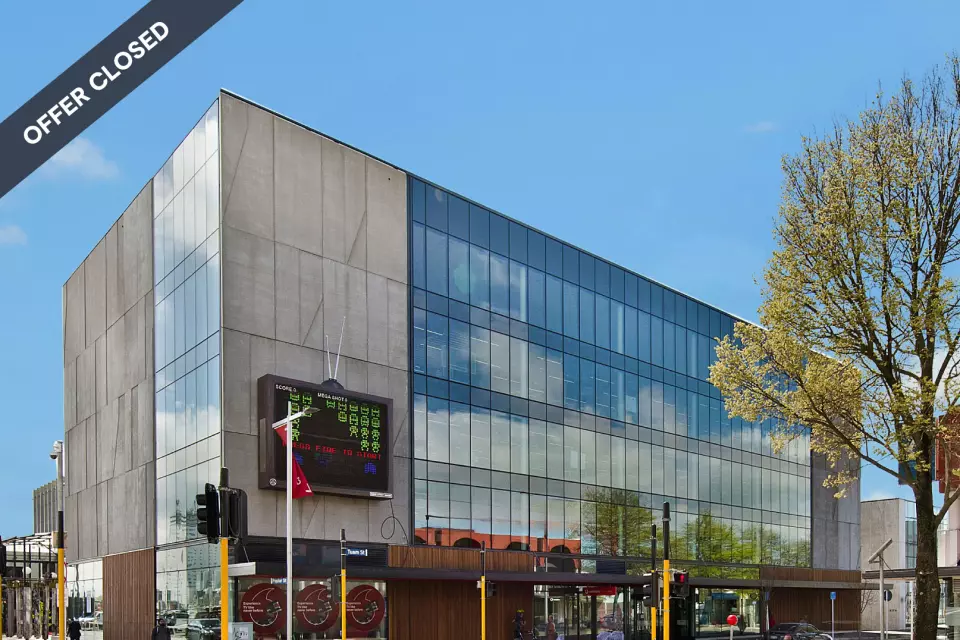Quality spaces, desirable locations & features are wooing more workers back to the office.
The future of work is here, with employers determined to wrest workforces back to offices that align with how they want to work.
This is translating to modern offices that include bespoke features and spaces that nurture human connection, as well as prioritising sustainability and functionality. While many people thrived working from home in the pandemic lockdown, office occupiers (workers and employers) have increasingly acknowledged the value of high-quality offices in fostering collaboration and innovation.
Post-Covid, businesses are actively encouraging workers back into the office while still allowing a certain latitude for flexible working. For some workers, this is impinging on their newfound quality of life, while for others it’s a welcome return to a more collaborative and work-focused space.
“The pendulum swung toward working from home, and now it’s swinging the other way as more employees recognise the value of the office,” says Matt McHardy, General Manager, Investor Relations at PMG Funds. “If you’re working on a specific project and you want to get into the weeds, maybe working from home will help because there will be zero distractions.
“But that really depends on your home environment – how good is your home office? Is your house dominated by kids or pets? If you’re in a customer-facing or leadership role, you need to be visible and be there for your customers or your team.”
Employees want better quality spaces
Generally, businesses want workers back in the office; over two-thirds (68 per cent) of businesses in Asia Pacific are tightening their hybrid working policies and focusing on increasing in-person attendance, according to CBRE research. Almost as many (66 per cent) say they have policies to enforce attendance, including performance and financial consequences.
For many businesses, tighter hybrid working policies could come at the cost of key employees. This makes the right office space an essential recruitment and retention tool. A few considerations that constantly remain at the top of occupiers’ priority list, according to the CBRE survey, are:
1. Public transport access
2. Onsite food and beverage options
3. Sustainable building features
One of the most notable changes in the post-COVID era is the widespread adoption of hybrid work models. Many companies have realised that employees can be productive while working remotely, however still acknowledging the value of in-person collaboration, and thus are embracing flexible work arrangements.
This has prompted a reimagining of what the new world of work looks like to enable more collaborative and connected workplace cultures.
JLL's recent Office Sentiment Survey revealed that while 16% of occupiers say they are considering reducing their space, this is balanced by 14% saying they are looking to increase their space.
“Employers know they have to compete with the home office, so they’re moving to better locations and looking for buildings with better amenities and looking for buildings with better amenity and end of trip facilities such as showers, bike racks and EV chargers,” says McHardy. “They know that getting people into the office and creating a better culture will help their businesses be more successful.”
BY THE NUMBERS
1.3 per cent vacancy rate for prime office space in Christchurch (JLL NZ’s Q2 Market Snapshot)
Below 3 per cent vacancy rates for premium office buildings across Auckland in mid-2023 (JLL NZ’s Q2 Market Snapshot)
$640 per sq m - average gross rents for prime office space in Wellington (JLL NZ’s Q2 Market Snapshot)
68 per cent - of companies are focusing on increasing office attendance or improving work efficiency (CBRE’s 2023 Asia Pacific Office Occupier Sentiment Survey)
64 per cent of businesses want to expand to ESG-certified buildings (CBRE’s 2023 Asia Pacific Office Occupier Sentiment Survey)
40 per cent of Kiwi commuters travel on foot, by bike, or public transport (JLL NZ’s Vertical Vacancy Review)
Collaboration with colleagues is the top reason New Zealand employees come into the office.
For more information and to download the Product Disclosure Statement, visit www.pmgfunds.co.nz/invest
High quality offices in demand
JLL’s recent New Zealand vacancy review shows and numbers that indicate a clear flight to quality in the office sector. Across the main centres, there is a clear correlation between the quality of the office and related vacancy and rental growth rates.
Higher quality office assets are better at holding their value and are experiencing rental growth, says McHardy, by investing in the kind of desirable features that attract quality tenants. This includes sustainability features like rooftop solar panels which cut tenants’ power costs and end-of-trip facilities for those who commute on foot or bike.
Premium assets in or nearby Auckland's waterfront, the Wellington CBD, and across the core Christchurch CBD, are seeing vacancy drop and good rental growth. With a proactive investment approach and some capital behind you, value can be added to well-located B grade assets, but other more inferior buildings and locations the value-add opportunity becomes increasingly less apparent.
Buying opportunity
For those who invest in commercial real estate, the office segment may well be at its most appealing right now. PMG Funds has recently launched an investment offer for its Direct Office Fund that will raise capital to reduce debt and position itself to acquire assets aligned to its strategy when the opportunity presents itself.
The portfolio comprises four properties spread across New Zealand, with a total value of $114 million – and the PMG team has invested strongly in sustainable features to meet evolving tenant expectations. At 95c per unit, with a forecast gross cash distribution return of 6.16 per cent*, this could represent an opportunity for savvy investors who know how to take advantage of market conditions.
“Our indicators say we are at a potential low point in the market, so our current Direct Office Fund Offer is the most attractive price ever,” says McHardy.
*Disclaimer:
PMG Property Funds Management Limited (PMG) is making an offer by way of units to be issued in PMG Direct Office Fund. A Product Disclosure Statement (PDS) for the offer is available and can be downloaded at the link provided. PMG, and members of the PMG Investor Relationships Team, do not provide financial advice. No person may offer, invite any offers, or distribute any documents (including a PDS) to any person outside New Zealand without the approval of PMG.
Indicative key metrics of the Fund are projected as of 30 November 2023, assuming successful completion of the current capital raise and associated debt repayment, amongst other factors. The indicative key metrics are stated based on information in the associated PDS and are subject to change.
The forecast gross cash distribution return is for the prospective period from 1 December 2023 to 31 March 2025. It is stated before tax, based on forecast gross distributions per annum expressed as a percentage of the expected unit issue price. Details on how the forecast gross cash distribution return is calculated and the risks associated with an investment in the Fund are available in the PDS.
Returns are subject to change and are not guaranteed. Past performance is not a reliable indicator of future performance. The information is of a general nature. It is not intended to be regulated financial advice for the purposes of the Financial Markets Conduct Act 2013 and does not take your particular circumstances into account. Like any investment, an investment in the Fund comes with risks and there is a chance you may lose some or all your investment.
Please read the PDS, and in particular the risk section, and seek advice from a licensed financial advice provider before making any investment decisions. This offer is open from Tuesday 7 November 2023 and closes Tuesday 28 November 2023. Information is correct as at 3 November.






